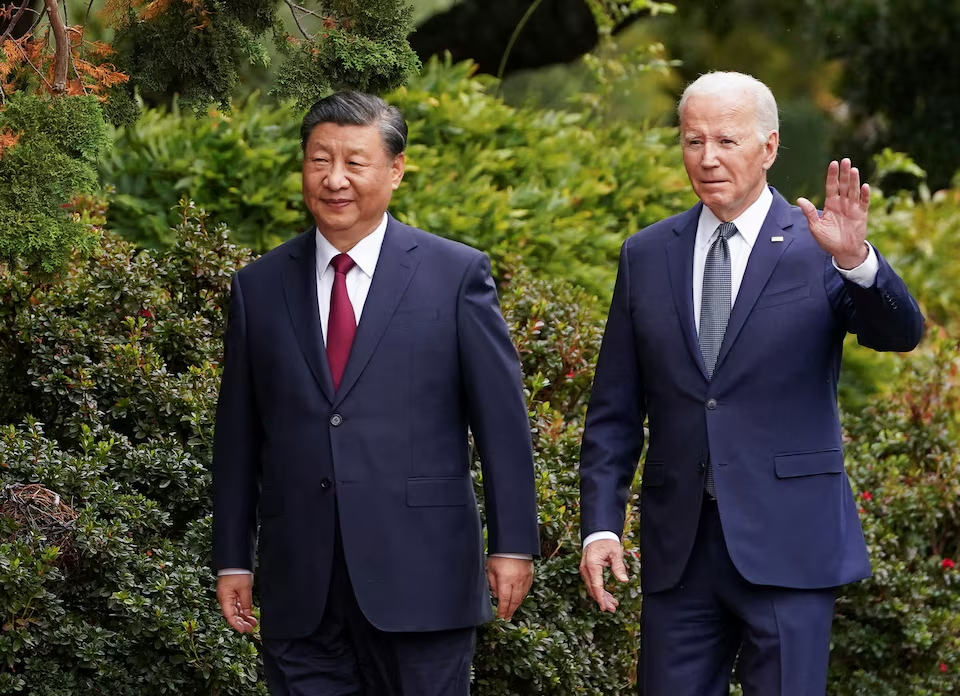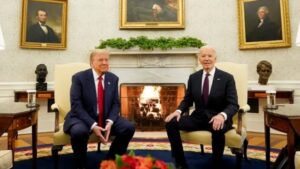
Exclusive Insight: Xi Pressures Biden to Soften U.S. Language on Taiwan
October 29, 2024
In a diplomatic maneuver that has sparked a wave of global debate, Chinese President Xi Jinping has reportedly urged U.S. President Joe Biden to tone down American rhetoric on Taiwan. This revelation, shared by an anonymous insider in diplomatic circles, highlights escalating tensions in the U.S.-China relationship over Taiwan’s political status. The pressure from Beijing comes amid an already sensitive landscape, where regional stability is continually tested by military exercises, cyber skirmishes, and a tense battle for influence in the Asia-Pacific.
The alleged request was reportedly made during private conversations between Xi and Biden, with the Chinese side asserting that softer language from Washington on Taiwan would be instrumental to reducing regional friction. But what could such a demand mean for Taiwan, the United States, and the greater balance of power in the region? And should Biden even entertain such a request? Many are questioning the implications of this revelation and, more pointedly, wondering if it signifies a shift in U.S. foreign policy and its long-standing commitment to Taiwan.
A Delicate Diplomatic Web
The United States, though not formally recognizing Taiwan as an independent state, maintains the Taiwan Relations Act (TRA), passed in 1979, which guarantees U.S. support to Taiwan in its self-defense against potential coercive actions. Washington’s “strategic ambiguity” policy has been pivotal in preserving peace and stability, walking a tightrope between China’s desire for reunification with Taiwan and Taiwan’s de facto independence. But Beijing’s pressure on Biden to dilute the language around Taiwan marks a potential destabilization of this longstanding approach.
In recent years, China has upped the ante, sending military jets into Taiwan’s airspace, conducting high-profile military drills in the Taiwan Strait, and building alliances with neighboring countries that, by their silence or active endorsement, implicitly support its “One China” policy. This policy, a central tenet of the Chinese Communist Party, holds that there is only one China, and Taiwan is an inseparable part of it.
According to insiders, Xi has called for Biden to avoid “provocative” language that might encourage Taiwanese aspirations for full independence, an issue China deems non-negotiable. Chinese officials argue that inflammatory rhetoric from Washington only emboldens Taiwan’s pro-independence politicians and fosters regional instability. Beijing claims this kind of rhetoric is a significant factor in the uptick of military posturing in the region, while U.S. officials counter that China’s escalating aggressions leave Taiwan no choice but to bolster its defenses.
Should Biden Consider Xi’s Proposal?
Biden now faces a complex decision: acquiesce to China’s demands, potentially pacifying Beijing but possibly alienating key allies like Japan, South Korea, and Australia, who rely on U.S. stability in the region. Dissenters argue that Biden’s move to change the language could embolden Beijing and send an alarming signal to other allies about America’s reliability. Critics warn that bowing to Xi’s pressure could inadvertently communicate that the U.S. is retreating from its commitment to Taiwan, giving China a green light to further tighten its grip on the self-governed island.
On the other side, some foreign policy experts argue that Biden should strategically temper the language on Taiwan to avoid unnecessary conflict with China, a crucial economic partner for the United States. With inflationary concerns in the U.S. and an economy increasingly intertwined with China’s, these experts suggest that prioritizing diplomatic language could stave off a crisis. These advocates believe that Biden should shift focus to de-escalation, fostering dialogue that deters an arms race in the Asia-Pacific region.
But critics within Washington’s halls of power remain vocal in their disagreement. Republican leaders have blasted any consideration of Biden’s softening stance on Taiwan, seeing it as a concession that diminishes American influence in the Indo-Pacific. They argue that appeasement only strengthens authoritarian regimes, leaving U.S. allies vulnerable.
Taiwan’s View: A Critical Stakeholder’s Perspective
For Taiwan, this diplomatic spat between Washington and Beijing is far from an abstract issue. Taiwanese President Tsai Ing-wen has steadily fortified Taiwan’s defenses, citing the growing threat posed by China’s military expansion. With the United States’ support, Taiwan has modernized its military and bolstered its alliances in the region, ensuring that it can withstand increasing pressure from Beijing.
From Taiwan’s perspective, the risk of Biden’s softened rhetoric is clear: it could potentially isolate Taiwan and weaken its position in future negotiations. Pro-independence factions in Taiwan are calling for Biden to affirm the United States’ support publicly and unambiguously, viewing any language adjustment as a betrayal of Washington’s commitment. Indeed, if Xi’s suggestion gains traction in Washington, Taiwan’s government will likely feel the ripple effects, possibly impacting Taiwan’s domestic political climate and its relationship with China.
The Geopolitical Chessboard
This revelation underscores a core truth in international relations: U.S.-China tensions over Taiwan are not isolated; they reverberate globally. Japan, the Philippines, and Vietnam all keep a close watch on these dynamics, knowing that Beijing’s influence is growing. A softened stance from Biden could strengthen Beijing’s hand, possibly emboldening China in disputed territories in the South China Sea and beyond. This may prompt neighboring nations to reconsider their security alliances, questioning whether the United States will stand firm in defense of shared values or lean toward appeasement.
The Biden administration’s response to Xi’s call for softer language on Taiwan may be one of the most consequential foreign policy decisions in recent history. How Washington navigates this pressure from Beijing will not only shape U.S.-China relations but will also have a lasting impact on global dynamics, freedom of navigation in international waters, and the sovereignty of small but democratic states like Taiwan.
Moving Forward: Will Biden Draw a Red Line?
For now, the Biden administration remains tight-lipped about whether it will heed Xi’s proposal. Some argue that diplomacy necessitates compromise, but others insist that altering language on Taiwan, even in subtle ways, is a dangerous precedent. For the United States, maintaining a robust yet careful stance on Taiwan is essential to its Indo-Pacific strategy. Altering this dynamic might project a wavering commitment to allies and a softened stance on authoritarian advances.
As Xi and Biden navigate this high-stakes balancing act, the world will be watching closely. The decisions made in Washington could either affirm America’s resolve as a defender of democracy or signal a subtle retreat under pressure from a resurgent China. The stakes could not be higher: Taiwan’s autonomy, regional stability, and the very essence of American foreign policy stand in the balance.
If Biden does yield to Xi’s demands, it could alter the trajectory of international relations for years to come.






